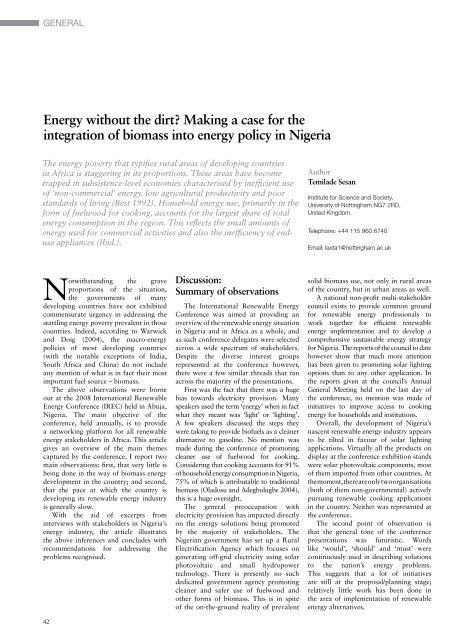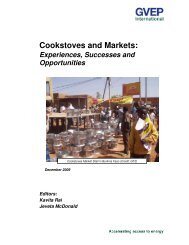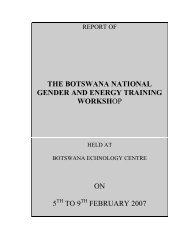Household Dynamics - HEDON Household Energy Network
Household Dynamics - HEDON Household Energy Network
Household Dynamics - HEDON Household Energy Network
You also want an ePaper? Increase the reach of your titles
YUMPU automatically turns print PDFs into web optimized ePapers that Google loves.
GENERAL<br />
<strong>Energy</strong> without the dirt? Making a case for the<br />
integration of biomass into energy policy in Nigeria<br />
The energy poverty that typifies rural areas of developing countries<br />
in Africa is staggering in its proportions. These areas have become<br />
trapped in subsistence-level economies characterised by inefficient use<br />
of ‘non-commercial’ energy, low agricultural productivity and poor<br />
standards of living (Best 1992). <strong>Household</strong> energy use, primarily in the<br />
form of fuelwood for cooking, accounts for the largest share of total<br />
energy consumption in the region. This reflects the small amounts of<br />
energy used for commercial activities and also the inefficiency of enduse<br />
appliances (Ibid.).<br />
Notwithstanding the grave<br />
proportions of the situation,<br />
the governments of many<br />
developing countries have not exhibited<br />
commensurate urgency in addressing the<br />
startling energy poverty prevalent in those<br />
countries. Indeed, according to Warwick<br />
and Doig (2004), the macro-energy<br />
policies of most developing countries<br />
(with the notable exceptions of India,<br />
South Africa and China) do not include<br />
any mention of what is in fact their most<br />
important fuel source – biomass.<br />
The above observations were borne<br />
out at the 2008 International Renewable<br />
<strong>Energy</strong> Conference (IREC) held in Abuja,<br />
Nigeria. The main objective of the<br />
conference, held annually, is to provide<br />
a networking platform for all renewable<br />
energy stakeholders in Africa. This article<br />
gives an overview of the main themes<br />
captured by the conference. I report two<br />
main observations: first, that very little is<br />
being done in the way of biomass energy<br />
development in the country; and second,<br />
that the pace at which the country is<br />
developing its renewable energy industry<br />
is generally slow.<br />
With the aid of excerpts from<br />
interviews with stakeholders in Nigeria’s<br />
energy industry, the article illustrates<br />
the above inferences and concludes with<br />
recommendations for addressing the<br />
problems recognised.<br />
42<br />
Discussion:<br />
Summary of observations<br />
The International Renewable <strong>Energy</strong><br />
Conference was aimed at providing an<br />
overview of the renewable energy situation<br />
in Nigeria and in Africa as a whole, and<br />
as such conference delegates were selected<br />
across a wide spectrum of stakeholders.<br />
Despite the diverse interest groups<br />
represented at the conference however,<br />
there were a few similar threads that ran<br />
across the majority of the presentations.<br />
First was the fact that there was a huge<br />
bias towards electricity provision. Many<br />
speakers used the term ‘energy’ when in fact<br />
what they meant was ‘light’ or ‘lighting’.<br />
A few speakers discussed the steps they<br />
were taking to provide biofuels as a cleaner<br />
alternative to gasoline. No mention was<br />
made during the conference of promoting<br />
cleaner use of fuelwood for cooking.<br />
Considering that cooking accounts for 91%<br />
of household energy consumption in Nigeria,<br />
75% of which is attributable to traditional<br />
biomass (Oladosu and Adegbulugbe 2004),<br />
this is a huge oversight.<br />
The general preoccupation with<br />
electricity provision has impacted directly<br />
on the energy solutions being promoted<br />
by the majority of stakeholders. The<br />
Nigerian government has set up a Rural<br />
Electrification Agency which focuses on<br />
generating off-grid electricity using solar<br />
photovoltaic and small hydropower<br />
technology. There is presently no such<br />
dedicated government agency promoting<br />
cleaner and safer use of fuelwood and<br />
other forms of biomass. This is in spite<br />
of the on-the-ground reality of prevalent<br />
Author<br />
Temilade Sesan<br />
institute for science and society,<br />
university of Nottingham NG7 2RD,<br />
united Kingdom.<br />
Telephone: +44 115 960 6740<br />
email: laxta1@nottingham.ac.uk<br />
solid biomass use, not only in rural areas<br />
of the country, but in urban areas as well.<br />
A national non-profit multi-stakeholder<br />
council exists to provide common ground<br />
for renewable energy professionals to<br />
work together for efficient renewable<br />
energy implementation and to develop a<br />
comprehensive sustainable energy strategy<br />
for Nigeria. The reports of the council to date<br />
however show that much more attention<br />
has been given to promoting solar lighting<br />
options than to any other application. In<br />
the reports given at the council’s Annual<br />
General Meeting held on the last day of<br />
the conference, no mention was made of<br />
initiatives to improve access to cooking<br />
energy for households and institutions.<br />
Overall, the development of Nigeria’s<br />
nascent renewable energy industry appears<br />
to be tilted in favour of solar lighting<br />
applications. Virtually all the products on<br />
display at the conference exhibition stands<br />
were solar photovoltaic components, most<br />
of them imported from other countries. At<br />
the moment, there are only two organisations<br />
(both of them non-governmental) actively<br />
pursuing renewable cooking applications<br />
in the country. Neither was represented at<br />
the conference.<br />
The second point of observation is<br />
that the general tone of the conference<br />
presentations was futuristic. Words<br />
like ‘would’, ‘should’ and ‘must’ were<br />
continuously used in describing solutions<br />
to the nation’s energy problems.<br />
This suggests that a lot of initiatives<br />
are still at the proposal/planning stage;<br />
relatively little work has been done in<br />
the area of implementation of renewable<br />
energy alternatives.





